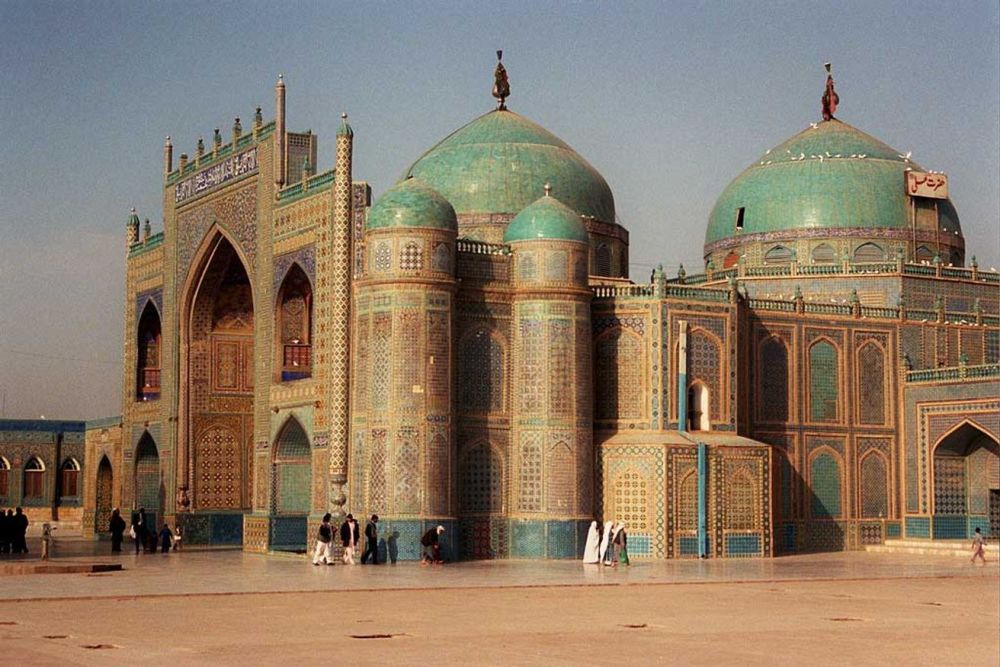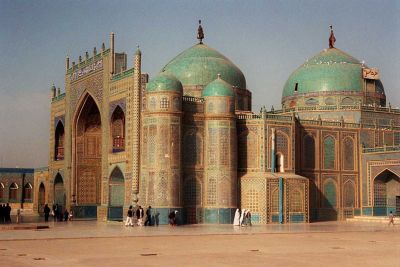

The shrine of Hazrat Ali, also known as the Blue Mosque, is a site of spiritual significance and a place of pilgrimage for many. A guided spiritual tour here encompasses the history, architecture, and religious importance of the mosque. Visitors are taken through the intricate pathways, as the guide narrates the story behind the mosque's establishment, its significance in Islamic history, and its association with Hazrat Ali, whom the shrine is believed to house. The peaceful ambiance and the beautiful blue tiles that give the mosque its name make for a meditative experience. Throughout the tour, visitors will have the opportunity to observe traditional Islamic practices and prayers, which provide a deeper understanding of local culture and devotion.
Observing the evening prayer, also known as 'Salat al-Maghrib', at the Hazrat Ali shrine is a tranquil activity that invites visitors to witness one of the most significant daily rituals in Islam. As the sun sets, the melodious call to prayer echoes throughout the shrine. Participants will be able to watch as worshippers gather to perform the prayer in unison, offering a unique insight into Islamic traditions and spiritual practices. During this time, the mosque is generally less crowded, allowing for a more intimate experience. The soft evening light reflecting off the blue tiles adds to the serene atmosphere, making it an ideal time for quiet reflection and photography.
The Cultural Exchange Meetup provides participants with the rare opportunity to engage with local scholars and residents in discussions about Islamic culture, Afghan history, and the significance of the Hazrat Ali Shrine within the local community. Taking place within the complex, it's an informal setting that encourages dialogue and understanding between different backgrounds. Visitors typically engage in this event with much curiosity and leave with a deeper appreciation for the region's traditions and beliefs. The exchange is facilitated by local experts and is an excellent way for travelers to immerse themselves in Afghan culture and to form meaningful connections with its people.
Art enthusiasts and culture lovers can experience the ancient art of Islamic calligraphy through this workshop held within the vicinity of the Hazrat Ali Shrine. An expert in Arabic script will introduce participants to the basic strokes, techniques, and materials used in calligraphy. This hands-on workshop allows visitors to create their own piece of art using traditional tools such as bamboo pens, ink, and special paper. Not only does this activity provide a deeper insight into the Islamic aesthetic that adorns the shrine, but it also offers a personal connection to the art form as participants acquire a skill they can appreciate for years to come.
The Full Moon Night Vigil is a local tradition that brings visitors and residents together to experience Hazrat Ali Shrine under the glow of a full moon. The site is known for its spiritual ambiance, and the full moon nights are believed to hold special blessings. During the vigil, participants may engage in prayer, meditation, or simply enjoy the peaceful atmosphere as the shrine is illuminated by the soft moonlight. It presents a unique opportunity for spiritual reflection and connection, set against the backdrop of the mosque's beautiful architecture. As a communal event, it also offers a rare glimpse into the collective devotional practices of the local Muslim community.
Photography enthusiasts will relish in the Heritage Photo Walk at Hazrat Ali Shrine. This activity is designed to explore the rich textures, colors, and historical elements that make the shrine a photographer's delight. With a focus on capturing the beauty of the architectural features and the essence of the spiritual environment, participants are led by a local photographer who shares tips on composition, lighting, and perspective. This is more than just a photo op; it's an educational journey through one of Afghanistan's most treasured landmarks. Attendees come away not only with stunning photographs but also with an increased appreciation for Afghan cultural heritage.
With a rich history spanning centuries, the Hazrat Ali Shrine is the ideal backdrop for a series of lectures designed to educate visitors on regional history, Islamic scholarship, and the Silk Road's influence on the culture of Taloqan. These historical lectures are conducted by local historians and religious scholars who possess a wealth of knowledge about the site and the surrounding region. Attendees can expect to gain a comprehensive understanding of the factors that have shaped the local landscape, both physically and spiritually. Through these engaging talks, the shrine serves as both a classroom and a subject, offering a multifaceted learning experience.
During the holy month of Ramadan, visitors and locals gather at the shrine for the community Iftar meal, marking the end of the daily fast. This tradition provides an authentic experience of Afghan hospitality and Muslim customs. Guests are invited to join in the communal breaking of the fast, with a variety of traditional foods and sweets laid out for the occasion. The Iftar meal is not only a time for nourishment but also for fostering goodwill and unity. It is truly a heartwarming event that encapsulates the spirit of sharing and caring that the month of Ramadan promotes.
The Floral Arrangement Workshop is a captivating way for visitors to engage with Afghan culture through the art of flower decoration. The workshop teaches participants the traditional methods used to adorn the shrine with floral arrangements, especially during religious festivals and special occasions. Using locally sourced flowers, the instructors guide everyone through the process of creating beautiful designs that are later placed throughout the mosque, adding to its natural beauty. This activity appeals to those looking to contribute to the mosque's aesthetic while participating in a long-standing cultural practice.
The Nighttime Qawwali Performance is an immersive musical experience held within the enchanting courtyard of Hazrat Ali Shrine. Qawwali is a form of Sufi devotional music that aims to lead listeners to a state of spiritual ecstasy. Attendees can expect to be captivated by the powerful vocals, rhythmic handclaps, and percussive beats as qawwals (performers) sing praises of divine love. The performance is typically held after the last evening prayer and serves as a means for the community to come together in appreciation of the arts and shared spiritual connection.
